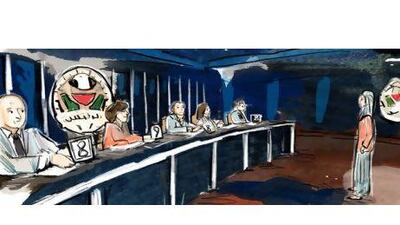The long-running feud that has stalled the Palestinian democratic process for years is finally over, with sensible, forward-thinking young candidates emerging as the leading force in a political arena traditionally dominated by cantankerous old ideologues.
As you have probably surmised, this is not a real-life scenario. It is, rather, an optimistic vision of the future brought to you by Palestine’s Ma’an broadcast network, makers of The President. The TV talent show aims to offer an alternative to the political process that has been stalled by the conflict between Fatah, the secular party that controls the West Bank, and Hamas, the Islamist party that governs the Gaza Strip. The Conflict of Brothers, or Wakseh, began in 2006, with factional fighting between the two splitting the Palestinian National Authority into two separate polities. Political – and sometimes military – hostilities have continued ever since, despite international reconciliation efforts aimed at restoring the joint election process.
Raed Othman, the director general of the Ma'an broadcast network, explained the thinking behind The President to Sky News: "I thought of this programme because we have to show that the Palestinian people understand and want real democracy. We want elections – real elections. But if we cannot have them then we can do our own.
“There are a lot of people who say we don’t have leaders, so we need to prove to them that there are a lot of leaders in Palestine. We want to teach the people that democracy is possible whenever we want.”
Described as a cross between The Apprentice and The X Factor, the 36-episode series sees 1,200 potential Palestinian leaders, all under age 35, being narrowed down to one in a conference room in an upmarket hotel in the West Bank city of Ramallah.
After the first episode back in March, Ziad Abu Zayyad of SFGC Jerusalem, which airs the programme in Israel, said: “The Arab Spring changed the Middle East, but today Palestinians have opted for a creative and non-violent approach to the problems they face, using reality TV to communicate the demands of the people.”
Running a big company, taking part in live debates, serving as an ambassador for a day, fielding questions from reporters and inspecting troops are among the tests contestants are put through before viewers vote on them by text message. These votes are then combined with marks from the panel of judges, which includes prominent figures such as the Palestinian legislator, activist and scholar Hanan Ashrawi and Ahmad Tibi, the deputy speaker of the Knesset and leader of Ta’al, an Arab party in Israel.
With nearly a third of the 4.2 million people in the West Bank and Gaza between the ages of 15 and 29 years old, the unemployment rate at nearly 25 per cent, real wages in steep decline and many members of society facing poverty, there is a real need for an outlet through which young people can vent their political frustrations without taking to the streets and hurling rocks at trigger-happy Israeli soldiers.
The 25-year-old contestant Maher al-Komi, from the West Bank city of Hebron, told Reuters: “I have a degree in media but I work in a corner store. We feel failure while hunger and unemployment rise.
“I hope my speaking on this show will make those in charge realise the problems of youth and make changes.”
Given the often intransigent nature of the Palestinian leadership on both sides of the factional divide, it is unlikely that the political culture in the territories is going to change anytime soon.
But in the meantime, The President provides a welcome showcase for a new generation of leaders, most of whom want to promote unity and espouse a non-violent approach to bringing about change, as well as providing a mass medium for disseminating new ideas about how to move forward.
The message to the current leadership, given the popularity of the show, seems clear: the people of Palestine want to switch to a different political channel.

